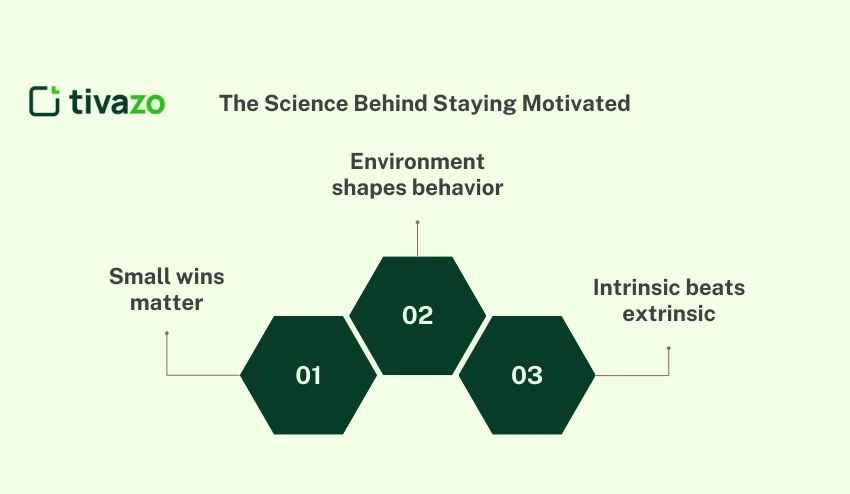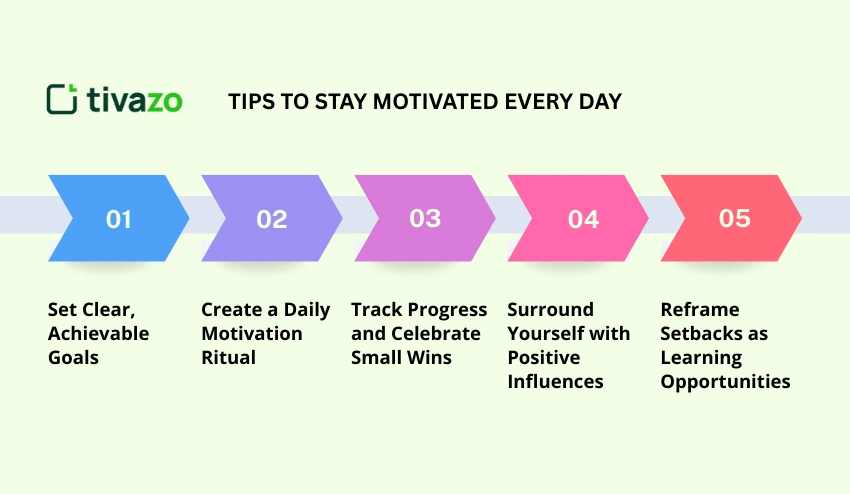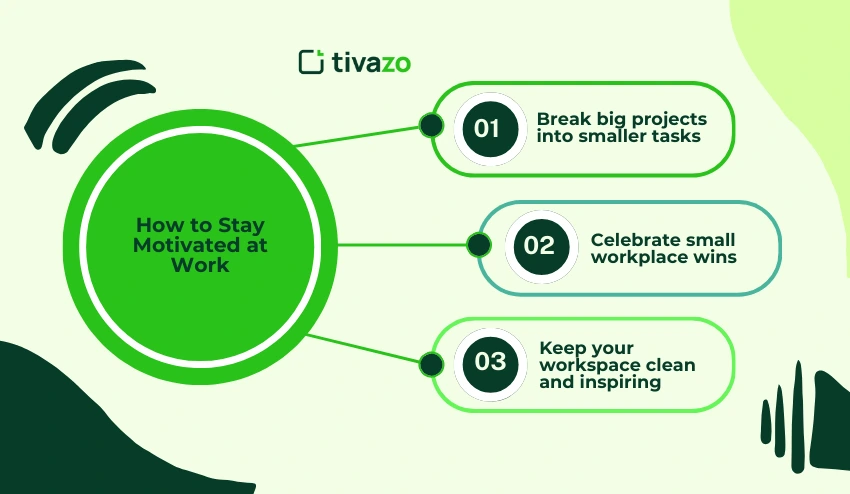Starting strong isn’t difficult, but staying consistent? That’s where people often fall short, not knowing how to motivate themselves for various life goals, whether it’s career advancement, healthier living, or personal growth.
The great news is that motivation comes from more than willpower. Motivation comes from having systems, a good mindset, and established habits that allow you to continue pushing through when the energy is gone.
In this guide, we will share 5 proven tips with both academic study and real-life success stories to help keep you motivated every day.
Key Highlights:
- Why It’s So Hard to Stay Motivated
- The Science Behind Staying Motivated
- Tips to Stay Motivated Every Day
- How to Stay Motivated in the Long Run
- How to Stay Motivated in Fitness & Health Goals
Why It’s So Hard to Stay Motivated
If motivation were a constant state, we’d see more people continue to go to the gym year after year after year, every inspired business idea on the planet would come to fruition, and there would be less clutter on computer hard drives from half-finished projects. The reality is that motivation is something that comes and goes, as it’s impacted by our energy levels, moods, and our surroundings.
Here’s why to stay motivated is so difficult:
- Procrastination – Your brain is wired to conserve energy and choose comfort over effort, and it makes it too easy to postpone doing hard things for the excuse of, “I’ll start tomorrow.”
- Burnout – You’re overtaxing yourself more than you’re capable of handling, causing your mind and body to resist the work. The resistance you feel will gradually chip away at your motivation
- Self-Doubt – If you don’t believe that you can succeed, your brain is going to find excuses to stop. Doubt creates inaction, and inaction kills motivation.
To stay motivated, you will need more than just a moment of inspiration. You need a functional plan – taking action with productive habits, changes to your environment, and shifts in your mindset – to keep going, even on the days when you don’t have as much energy or excitement.
The Science Behind Staying Motivated
Motivation is not just an ephemeral feeling; it is tied to brain chemicals. The star of this story is dopamine, the feel-good brain chemical. Each time you feel a sense of achievement and anticipation, dopamine is released, giving you a mental reward that reinforces those actions in the future.
Here is what science has told us about maintaining motivation:

- Small wins matter – A small task, say making your bed or sending an email, releases dopamine, and you are rewarded for acting and completing a task. You can now continue to gather these micro-wins that produce dopamine and start acting and completing larger, more audacious, challenging goals.
- Environment shapes behavior – your surroundings can deplete energy or fuel it. If you have clutter everywhere, don’t have control over distractions, friends tell you it’s a challenge, a negativity, it might zap your energy. On the flip side, having an organized space, positive surroundings, and escaping distractions will help you get through the constant noise and will provide the help and energy you need to stay consistent.
- Intrinsic beats extrinsic – Rewards (money, praise, etc.) are extrinsic motivators and can spur you to act with short-term motivation. If your goals are aligned with meaning and personal values, you will have intrinsic motivation and will have a longer duration for motivation to persist. When you truly care about the outcome through the challenges, you will stick to your commitment and become consistent.
By understanding the science behind motivation, you can create habits, environments, and goals that will help keep your motivation up, without relying entirely on willpower.
5 Proven Tips to Stay Motivated Every Day
5 Proven Tips to Stay Motivated Every Day:

1. Set Clear, Achievable Goals
A vague goal of “I want to get fit” or “I want to be successful” could be motivating at first, but that motivation is lost quickly due to the lack of clarity on what to do next. To stay motivated, you need to know what success looks like. The SMART goal framework–Specific, Measurable, Attainable, Relevant, and Time-bound–provides that clarity for you. Instead of “I want to get fit”, a SMART goal would look like “I will jog 20 minutes, three times a week, for the next month.” When you break large goals into smaller, daily micro-goals, you stay in motion and the little wins along the way are motivating, too.
2. Create a Daily Motivation Ritual
Motivation is nothing you can wait for; it is a routine that is built. Once you start your day with actions to get you into “movement”, it is easier to stay motivated for longer periods without relying only on motivational bursts of inspiration. It can be 10 affirmations in the morning, reading a few pages of a motivational book, or doing just 5 minutes of light stretching or exercise. When you quickly build habits that become routine, you will start to signal to your brain that your body is ready to start working toward achievement.
3. Track Progress and Celebrate Small Wins
One of the quickest ways to lose motivation is to feel like you are making zero progress. This is why feeling and tracking your progress, or achievements, is vital to stay motivated.You can write them down in a journal, put them on a whiteboard, or use apps such as Todoist or notion. Seeing your progress visually can feel unbelievably powerful, in ways that create momentum.
There are a few consequences to achieving milestones; the first is reward! You shouldn’t need to wait to reach a major milestone to reward yourself. Recognize what you did and reward yourself for moving structure and culture forward. It’s vital to recognize small wins; small wins create dopamine in the brain that can make it less difficult and even enjoyable to keep moving forward.
4. Surround Yourself with Positive Influences
Your environment and social network play a critical role in your desired performance and motivation. Negative voices, toxic environments, unmotivated peers, or bad experiences can eat away at your passion, whereas supportive people can motivate you and help propel you along your path. Find an accountability partner you can check in with, track down online or in-person communities they might have the same goals as you, and make it a point to minimize the time you spend with those that want to discourage your efforts. By managing who and what you let in, you will have an environment that helps you soar instead of holding you hostage.
5. Reframe Setbacks as Learning Opportunities
Setbacks are part of life, but how you react to them is essential in determining whether you quit or maintain your motivation. Instead of thinking about the problems in terms of failure, try and consider them as feedback. Asking yourself, “what can I learn from this?” will help you say the same thing, and hopefully use the learning to alter your approach the next time you experience something similar.
If you can cultivate a growth mindset, you can continuously grow and learn from the challenges and setbacks you have. That learning is growth and will allow you to gain momentum and progress forward; it also allows you to lose the fear of messing up. When you lose the “mess up” fear, that’s when you really build that long-term motivation.
Motivation Killers You Should Avoid
Even the most motivated, action-oriented people can lose their drive and motivation if they don’t realize that they have introduced some negative habits into their lives. If you want to stay motivated, it is not just about adding good habits or practices, but rather about eliminating habits or practices that suck the energy and focus from you.
- Negative self-talk – How you talk to yourself affects your mindset. If the self-talk in your head consists of “I can’t,” “I’m not good enough,” “I will probably fail,” you are effectively programming your own brain to quit before you even start. Instead, replace those phrases with constructive ones like “I will try” or “I can learn this,” so that your self-talk can propel you forward, not hold you back.
- Overloaded schedules – There is a difference between being busy and productive. By having too many things on your to-do list, you are overwhelming your brain and decreasing motivation. When you focus on less, more important tasks, you are spending your energy on meaningful actions and you create momentum to keep you going.
- Constant comparison – In a time of social media, viewing your behind-the-scenes as others showcase their highlight reel is easy. This can quickly lead to disappointment and self-doubt. Instead, monitor progress compared to your own previous self. Your journey is your own, and progress, no matter how small, is still progress.
Getting rid of those demotivators is like pulling weeds from a garden; you create space in which your goals can grow.
How to Stay Motivated in the Long Run
While short bursts of inspiration are a great kick-off, they are hardly enough to get you to the finish line. Real progress is made from consistently motivated effort over weeks, months, or years, and that necessitates more than occasional excitement.
- Develop habits that allow you to take effort without second thought.
- Allow scheduled rest days to prevent burnout.
- Revisit your “why” regularly to refresh your drive.
Tools & Resources to Boost Motivation
If you want to stay motivated, leveraging the right tools and resources can make a huge difference. These help you track progress, build habits, and stay inspired—even on days when your energy dips.
- Books: Atomic Habits by James Clear, The Motivation Myth by Jeff Haden.
- Apps: Forest, Habitica, Brain.fm.
- Podcasts: The Ed Mylett Show, The Mindset Mentor.
Using these resources consistently can help you stay motivated by keeping your goals visible, progress measurable, and mindset primed for action.
How to Stay Motivated at Work
It can be difficult to keep yourself to stay motivated at work, especially if you’re feeling a bit overwhelmed and everything feels like it’s a daunting project, or you have a looming deadline. If you want to stay motivated at work throughout long working hours, you will need strategies that you can use to keep your energy and focus sufficiently high.

- Break big projects into smaller tasks – Large projects and assignments can feel daunting and sap your motivation. If you take the time to break up your assignments into smaller parts, you will be able to take them one area at a time, and you will also feel a sense of accomplishment and success each time you finish a piece of the work, which helps keep you motivated to keep going.
- Celebrate small workplace wins – Celebrations don’t have to be saved for the end of a project. Acknowledge progress at the smallest level, from finishing writing a report to solving a difficult problem to helping a colleague. These micro-celebrations will release dopamine, which will provide you with brief feelings of energy and focus due to your accomplishment.
- Keep your workspace clean and inspiring – A place that is disorganized or not inspirational will cost you mental energy and also potentially sap your motivation. Being organized helps you to cut back on distractions, so if the work that is being completed at your desk or office is going to be hard work, pulling distractions from that to take away some of the cognitive and emotional load is helpful. Organizing and tinkering in your office or desk space will help you not only engage with your tasks but also increase productivity.
By putting into place some of these simple habits, you can continue to build forward momentum for the next time you need to work best in an office, no matter how daunting the day or task is.
How to Stay Motivated in Fitness & Health Goals
The first aspect to consider to stay motivated is tracking your workouts so you can see your progress over time. You could set small, achievable goals like “run 10 minutes every day” or “get three workouts done this week”, to give you a sense of accomplishment. Having a workout buddy and being part of a fitness group adds a level of accountability and encouragement. Keep in mind that consistency is much more valuable than perfection; by being consistent, you will create a habit of health and fitness that you can continue to build on.
Conclusion
When we talk about motivation, we can’t forget that motivation is not an instant phenomenon, but is the result of your actions and habits. You can build your motivation by taking the actions and habits mentioned in this chapter. Clearly set goals, consistently create routines, take wins when you get them, keep positive people around you, and “reframe” your failure into a learning moment when you don’t get the outcome you hoped for. You control your motivation, so seize the moment and create an action plan today, take one little step today, and see your momentum build each day, turning effort into progress.




